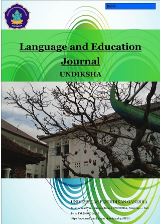THE FAMILY VALUES AND NEGATIVE STEREOTYPE EXISTING IN FILM “MY NAME IS KHAN”
DOI:
https://doi.org/10.23887/leju.v5i1.33592Abstract
Rizwan Khan is one of the characters which can be the representation of Muslims living in United States. It is one of the characters existing in the film “My Name is Khan”. This study aimed to analyze the family values of the film and the prejudice toward Muslims living in United States. The research design of this study was content analysis which focused on how the family values appeared on the film and identify the prejudice in the film. It was found that there were three different family values, such as Indian family values, American White family values, and American Black family values. Each family has its own characteristic in raising their children. The prejudice toward Muslims was found in almost scenes of the film after the ninth of September tragedy. The prejudice led to the intolerance, hatred and violence. It influenced the economic, comfort and social life of Muslims living in United States. It can be concluded that every family has different ways in raising their children. In addition, not all Americans have tolerance and accept differences in their neighborhoods.
References
Anurogo, D. & Ikrar, T. (2015). Sindrom asperger. Comprehensive Herbal Medicine, 42(2).
Ary,D., Jacobs, L.C., Sorensen, C, & Razavieh. (2010). Introduction to research in education. Canada: Wadsworth, Cengage Learning.
Balraj, B.M. (2011). “My name is khan and I am not a terrorist”: Representation of Muslims in ‘my name is khan’. Journal of Language and Culture, 2(6), 91-95.
Ciftci, S. (2012). Islamophobia and threat perceptions: Explaining anti Muslim sentiment in the West. Journal of Muslim Minority Affairs, 32(3), 293-309.
Chadda, R.K. & Deb, K.S. (2013). Indian family system, collectivistic society, and psychotherapy. Indian J Psychiatry, 55, 299-309.
Erndl, K.M. (2016). Religious and national identity in my name is khan. Journal of Religion and Film, 20(1), 1-23.
Levine, D.R. (1982). Beyond language: Intercultural communication for English as a second language. New Jersey: Prentice Hall Regents.










